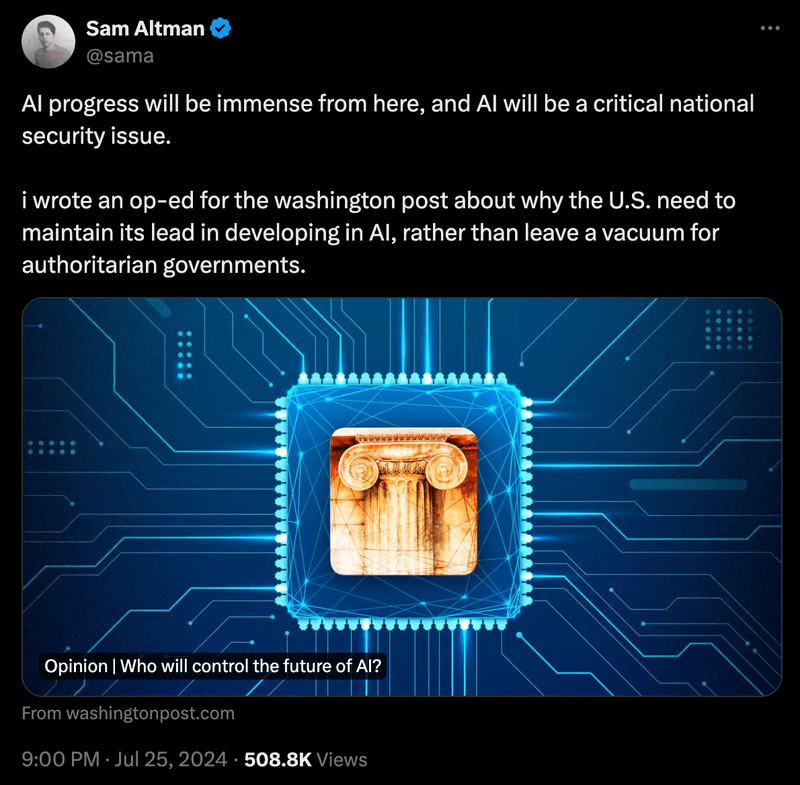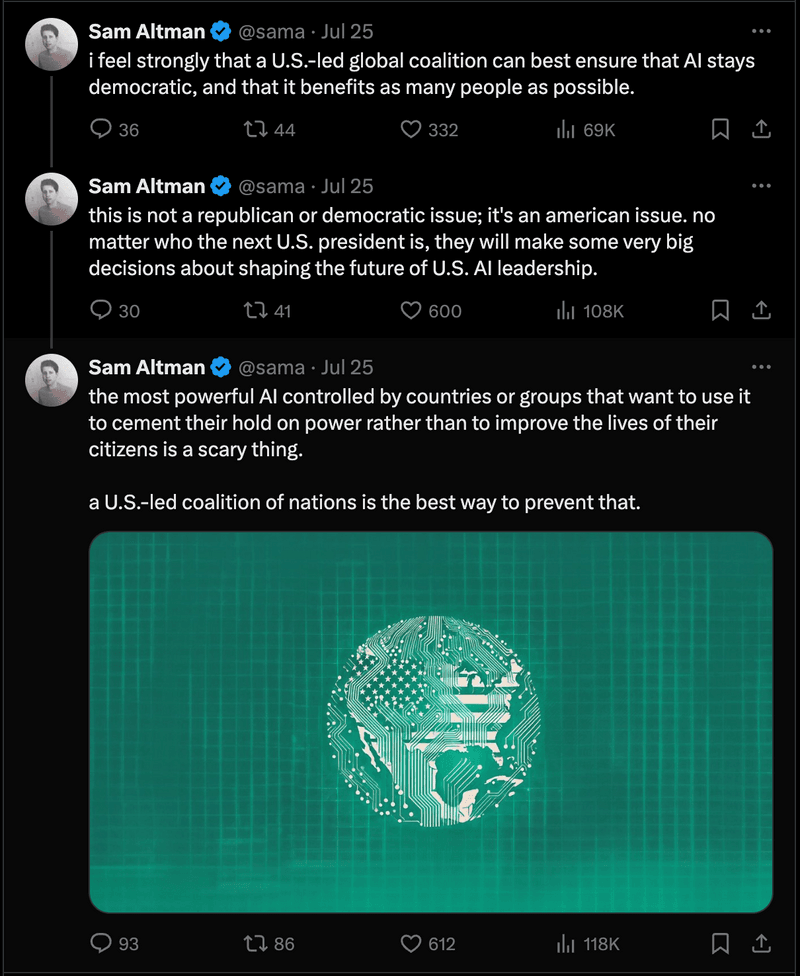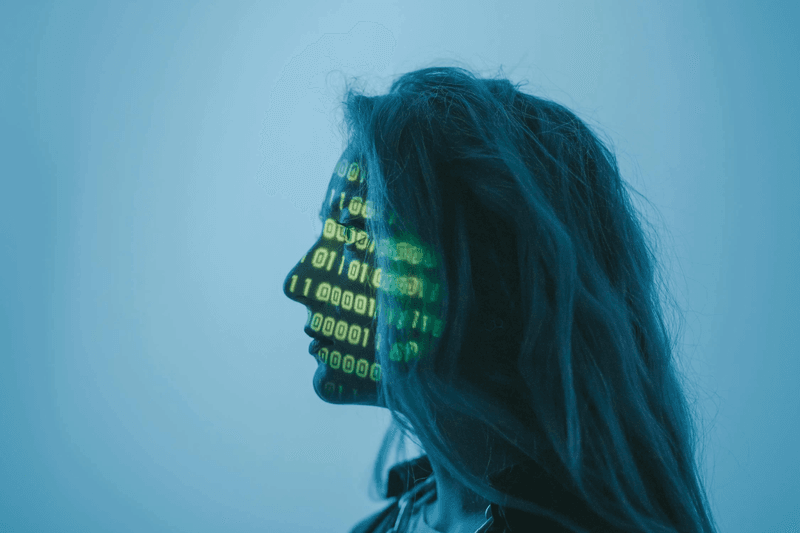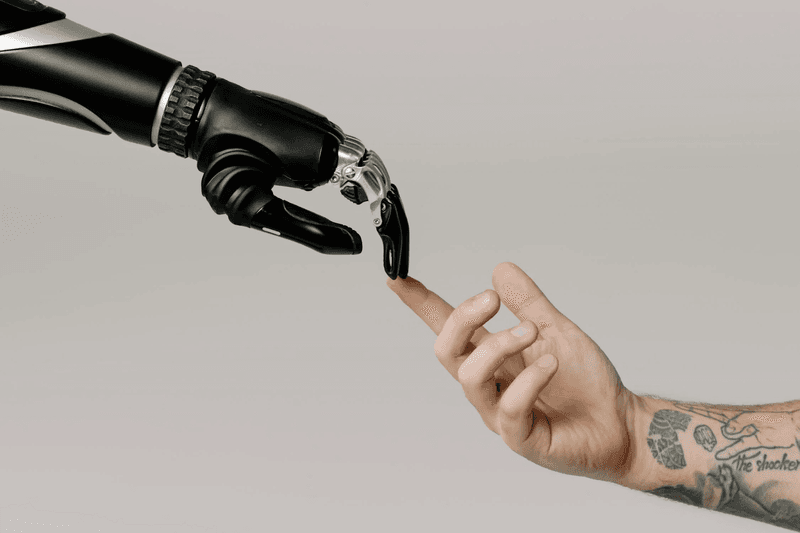Sam Altman Sounds the Alarm: Who Will Control the AI Future?
As AI continues to transform our world, the race for control is heating up, and the stakes couldn't be higher.
Sam Altman, CEO of Open AI, a key player in AI development, has stepped into the spotlight and published an op-ed letter that's got everyone talking.
He's sounding the alarm on the potential consequences of who ends up calling the shots in the AI realm.
Will it be a future where AI's benefits are shared widely or one where a select few hold all the power?
Let's get into Altman's vision for AI's future, explore the risks of authoritarian control, and uncover what needs to happen to ensure a brighter tomorrow.
Why did Sam Altman Write an Op-Ed Letter?

Sam Altman, a prominent figure in AI development, wrote an op-ed letter to address the urgent question of our time: who will control the future of AI?
Altman's letter emphasizes the strategic choice facing the world regarding artificial intelligence.
He argues for a U.S.-led global coalition to advance AI that spreads its benefits and maintains open access, contrasting this with an authoritarian approach that could restrict AI's societal benefits.
Altman outlines 4 key areas for the U.S. to focus on:
- Robust security measures
- Infrastructure development
- Public-private partnerships
- Job creation
He stresses the importance of maintaining a lead in AI development, warning of the risks if authoritarian regimes gain control.
Altman compares AI's significance to that of electricity or the internet, highlighting its potential to reshape society.
By writing this op-ed, Altman aims to influence policy and public opinion, advocating for a democratic vision of AI's future.
What was Mentioned in the Op-Ed letter
Altman wrote in an op-ed published Thursday, July 25th. While we can't cover the entire letter because it will be too long, here are the major points that Sam Altman mentioned in his op-ed letter.
1. The Urgent Question of AI Control
Altman begins by highlighting the critical nature of AI development:
"That is the urgent question of our time. The rapid progress being made on artificial intelligence means that we face a strategic choice about what kind of world we are going to live in: Will it be one in which the United States and allied nations advance a global AI that spreads the technology's benefits and opens access to it, or an authoritarian one, in which nations or movements that don't share our values use AI to cement and expand their power?"
This sets the stage for the entire letter, emphasizing the global race for AI dominance and its potential consequences.
2. The Risk of Authoritarian AI
Altman warns about the dangers if authoritarian regimes take the lead in AI:
"These authoritarian regimes and movements will keep a close hold on the technology's scientific, health, educational and other societal benefits to cement their own power. If they manage to take the lead on AI, they will force U.S. companies and those of other nations to share user data, leveraging the technology to develop new ways of spying on their own citizens or creating next-generation cyberweapons to use against other countries."
He's worried that these countries might use AI to spy on people, make powerful weapons, and keep the benefits of AI to themselves.
3. Current State of AI
Altman describes the current capabilities of AI:
"The first chapter of AI is already written. Systems such as ChatGPT, Copilot and others are functioning as limited assistants — for instance, by writing up patient visits so nurses and doctors can spend more time with the sick, or serving as more advanced assistants in certain domains, such as code generation for software engineering."
He's saying that AI is already helping in areas like healthcare and computer programming, but it's still limited in what it can do.
4. Need for a Global Coalition
Altman calls for international cooperation:
"If we want to ensure that the future of AI is a future built to benefit the most people possible, we need a U.S.-led global coalition of like-minded countries and an innovative new strategy to make it happen."
He thinks the U.S. should lead a group of countries to make sure AI helps everyone, not just a few.
5. Security Measures
On the importance of cybersecurity in AI development:
"First, American AI firms and industry need to craft robust security measures to ensure that our coalition maintains the lead in current and future models and enables our private sector to innovate. These measures would include cyberdefense and data center security innovations to prevent hackers from stealing key intellectual property such as model weights and AI training data."
Altman wants all the companies to make sure their AI systems are safe from hackers. This will help keep important information about how AI works from being stolen.

The Importance of AI Control: What’s at Stake?

Controlling AI is crucial because it will shape our future.
The race for AI dominance isn't just about technology – it's about the values that will guide our world.
There are two main paths:
A democratic approach led by the U.S. and allies, focusing on sharing AI benefits widely.
An authoritarian approach, where AI is used to increase power and control.
The stakes are high. If authoritarian regimes win the AI race, they might:
Restrict access to AI's benefits in science, health, and education
Force companies to share user data
Develop advanced cyber-weapons
Create new ways to spy on citizens
What Needs to Happen Now?
To ensure a democratic future for AI, several key actions are necessary:
Strengthen Security: U.S. AI companies must develop robust cybersecurity measures. This includes protecting data centers and using AI-powered defenses against hackers.
Build Infrastructure: The U.S. needs to rapidly expand its AI infrastructure. This means more data centers and power plants to run AI systems.
Form Partnerships: Public-private collaborations are crucial. Government and tech companies should work together on security and infrastructure projects.
Create Jobs: Right use of AI can lead to new job opportunities across the country, potentially forming a new industrial base.
Global Coalition: The U.S. should lead a coalition of like-minded countries to promote a democratic vision for AI development and use.
By taking these steps, we can work towards an AI future that benefits the most people possible, rather than concentrating power in the hands of a few.
The Future of AI: What Could It Look Like?

As we look ahead, AI is going to reshape various aspects of our lives and society. While the possibilities are vast, let's focus on three key areas where AI could have a profound impact:
1. AI Assistants and Personalized Learning
AI assistants are likely to become more important, transforming how we work, learn, and interact with technology. In education, this could lead to a revolution in personalised learning.
AI tutors adapting to individual learning styles and paces
Real-time feedback and customized lesson plans
Accessibility improvements for students with special needs
Potential for lifelong learning support across various subjects
2. Scientific Breakthroughs and Healthcare Advancements
The power of AI in processing vast amounts of data and recognizing patterns could accelerate scientific discoveries, particularly in healthcare and drug development.
Faster drug discovery through AI-powered simulations
Personalized treatment plans based on genetic and lifestyle factors
Early disease detection using AI analysis of medical images and patient data
Potential for AI to assist in complex surgeries or medical decision-making
3. Ethical Challenges and Societal Impact
As AI becomes more integrated into critical decision-making processes, we'll face new ethical dilemmas and societal challenges.
Ensuring fairness and reducing bias in AI-driven decisions
Balancing automation with human employment and purpose
Protecting privacy in an increasingly AI-driven world
Addressing the environmental impact of energy-intensive AI systems
These developments highlight the immense potential of AI to improve our lives, but also underscore the need for careful consideration of its implementation and impact.
As we move forward, it will be crucial to get an open dialogue and collaboration between technologists, policymakers, and the public to shape an AI future that benefits all of humanity.
Conclusion
Sam Altman's op-ed letter has shed light on the critical crossroads we face in AI development. He's made it clear that the future of AI isn't just about cool tech – it's about the values that will shape our world.
Altman calls for a U.S.-led global effort to ensure AI benefits everyone, not just a powerful few. He warns of the risks if authoritarian regimes take the lead, potentially using AI for surveillance and weapons.
To counter this, Altman suggests focusing on security, infrastructure, partnerships, and job creation. Looking ahead, AI could revolutionize education, accelerate scientific breakthroughs, and transform healthcare.
But it also brings ethical challenges we'll need to tackle. As we move forward, it's crucial that we work together – tech experts, policymakers, and the public – to create an AI future that's fair, beneficial, and open to all. The choice is ours to make, and the time to act is now.
FAQs
1. Does Elon Musk still own OpenAI?
No, Elon Musk does not own OpenAI anymore. He left OpenAI in late 2017 to focus on creating a relevant competitor to Google/DeepMind. While Musk initially supported OpenAI, he decided to step away and pursue other ventures in artificial intelligence.
2. When did Sam Altman become CEO of OpenAI?
Sam Altman became the CEO of OpenAI in 2019. Before becoming CEO, Altman was president of the start-up accelerator Y Combinator from 2014 to 2019. His leadership at OpenAI has been significant in advancing artificial intelligence research and development.
3. Who invented ChatGPT?
ChatGPT was invented by the team at OpenAI. The key contributors included co-founders Ilya Sutskever, Greg Brockman, John Schulman, and Wojciech Zaremba. Sam Altman later joined as CEO, and the project was led by researchers Ilya Sutskever and Dario Amodei.

Comments
Your comment has been submitted